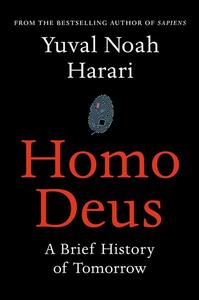You need to sign in or sign up before continuing.
Take a photo of a barcode or cover
informative
reflective
slow-paced
Não tão bom como o Sapiens. Peca por repetir bastante as ideias do primeiro livro, salvando-se as novas ideias do último terço do livro.
Sapiens: past
21 lessons for the 21st century : present
Homo Deus : Future in the eyes of present
I feel glad that I read these books in the exact above sequence (though there was an elongated intermission in between the reading of 1st and 2nd one).
I wish to read these books back to back and again.
Note to Self: Update the Reviews and Highlights
21 lessons for the 21st century : present
Homo Deus : Future in the eyes of present
I feel glad that I read these books in the exact above sequence (though there was an elongated intermission in between the reading of 1st and 2nd one).
I wish to read these books back to back and again.
Note to Self: Update the Reviews and Highlights
Après avoir dévoré Sapiens, j’avais hâte de me mettre à celui-ci. J’avais peur, au départ, de redites trop répétées avec le premier livre -ce qui est compréhensible, Homo Deus creusant le sujet plus loin, mais s’il cite Sapiens, ce n’est jamais lourd ou trop redondant.
Homo Deus, comme écrit plus haut, reprend les grandes idées de Sapiens, en poussant les thèmes plus avant, et en se concentrant sur différents points de vue et thématiques, notamment la religion, la société, les grandes entreprises, la technologie, et la place de l’Homme au milieu de ce fouillis. Il est difficile d’en parler, car il aborde beaucoup de sujets très différents, mais Harari est pour sur un très bon écrivain. Son style sait être léger et accessible, même lorsqu’il aborde des sujets complexes ou grave, comme le dataïsme et les dérives politiques.
Je ne saurai que vous recommender Homo Deus, que j’ai, pas certains aspects, préféré à Sapiens - peut-être car les thèmes abordés me touchent plus, notamment la partie sur le transhumanisme. Un exercise de pensé provocant, qui permet de se poser de nombreuses questions, tout en restant agréable à lire, sans trop se prendre au sérieux. Merci, Yuval Noah Harari !
After having devoured Sapiens, I was looking forward to this one. I was afraid, at the beginning, that there would be too much repetitions with the first book- which is understandable, Homo Deus dining the subject further, but if it cites Sapiens, it is never heavy or redundant.
Homo Deus, as written earlier, takes up again the main ideas in Sapiens, by pushing the themes further, while concentrating on different point of views and themes, namely religion, society, big firms, technology, and the place of Man in between all this mess. It is difficult to talk about it, because it tackles many different subjects, but Harari is for sure an awesome writer. His writing style is light and intelligible, even when it addresses complex or serious subjects, like dataism or political drifts.
I can only recommend Homo Deus, that I, on some levels, preferred to Sapiens -maybe because the themes here are more interesting to me, namely the part on transhumanism. A provoking thought exercise, that allows to reflect on a lot of questions, all the while remaining enjoyable, without taking itself too seriously. Thanks Yuval Noah Harari !
Homo Deus, comme écrit plus haut, reprend les grandes idées de Sapiens, en poussant les thèmes plus avant, et en se concentrant sur différents points de vue et thématiques, notamment la religion, la société, les grandes entreprises, la technologie, et la place de l’Homme au milieu de ce fouillis. Il est difficile d’en parler, car il aborde beaucoup de sujets très différents, mais Harari est pour sur un très bon écrivain. Son style sait être léger et accessible, même lorsqu’il aborde des sujets complexes ou grave, comme le dataïsme et les dérives politiques.
Je ne saurai que vous recommender Homo Deus, que j’ai, pas certains aspects, préféré à Sapiens - peut-être car les thèmes abordés me touchent plus, notamment la partie sur le transhumanisme. Un exercise de pensé provocant, qui permet de se poser de nombreuses questions, tout en restant agréable à lire, sans trop se prendre au sérieux. Merci, Yuval Noah Harari !
After having devoured Sapiens, I was looking forward to this one. I was afraid, at the beginning, that there would be too much repetitions with the first book- which is understandable, Homo Deus dining the subject further, but if it cites Sapiens, it is never heavy or redundant.
Homo Deus, as written earlier, takes up again the main ideas in Sapiens, by pushing the themes further, while concentrating on different point of views and themes, namely religion, society, big firms, technology, and the place of Man in between all this mess. It is difficult to talk about it, because it tackles many different subjects, but Harari is for sure an awesome writer. His writing style is light and intelligible, even when it addresses complex or serious subjects, like dataism or political drifts.
I can only recommend Homo Deus, that I, on some levels, preferred to Sapiens -maybe because the themes here are more interesting to me, namely the part on transhumanism. A provoking thought exercise, that allows to reflect on a lot of questions, all the while remaining enjoyable, without taking itself too seriously. Thanks Yuval Noah Harari !
I've definitely read this book 10 years too late. Lots of Harari's claims are a little outdated yeah, we'll definitely never encounter anything as bad as the Spanish flu, won't we... .
Yet, I was very intrigued by the ideologies explained throughout this book and how they influence our progress.
What I found uncomfortable was that the focus of the book was very eurocentric and awkwardly focused on pretty ugly parts of society (read: the egocentric mentality of humans).
I managed to finish the book quite quickly though, yet my opinions are still divided.
Yet, I was very intrigued by the ideologies explained throughout this book and how they influence our progress.
What I found uncomfortable was that the focus of the book was very eurocentric and awkwardly focused on pretty ugly parts of society (read: the egocentric mentality of humans).
I managed to finish the book quite quickly though, yet my opinions are still divided.
inspiring
reflective
medium-paced
After Sapiens, there was big shoes to fill and this didn't quite accomplish that. While interesting in some parts, it wasn't to my taste and I got bored about less than half way through so didn't finish.
Quyển sách khá hay về tương lai của con người. Từ người tinh khôn đến người hiện đại, con người đang dịch chuyển sang cuộc cách mạng lần thứ 4. Con người tương lai sẽ được thay thế bằng trí tuệ nhân tạo và máy móc. Đế chế lớn nhất không còn là các cường quốc chính trị hiện tại mà là các công ty nắm dữ liệu khổng lồ như Google và Facebook.
Hiện tại thì đúng là chủ nghĩa nhân văn, nơi chú trọng trải nghiệm của con người, được dần thay thế bằng tôn giáo dữ liệu, nơi mà dữ liệu là thứ quan trọng hơn tất cả. Con người hiện nay thay vì hướng tới trải nghiệm thì dần chuyển sang "Ghi lại, tải lên mạng và chia sẻ". Dần dần trong tương lai, các thuật toán thông minh sẽ hiểu rõ chúng ta hơn là chính bản thân chúng ta hay người thân. AI biết rõ chúng ta thích cái gì, muốn cái gì, bệnh án di truyền như thế nào, phản ứng ra sao và quyết định như thế nào. Công việc chính của con người tương lai chỉ là góp phần vào dòng chuyển thông tin dữ liệu.
Đọc quyển sách Homo Sapiens và Homodeus giống ý tưởng của quyển Origin: trả lời hai câu hỏi chính của nhân loại là con người từ đâu đến và con người đi về đâu.
Hiện tại thì đúng là chủ nghĩa nhân văn, nơi chú trọng trải nghiệm của con người, được dần thay thế bằng tôn giáo dữ liệu, nơi mà dữ liệu là thứ quan trọng hơn tất cả. Con người hiện nay thay vì hướng tới trải nghiệm thì dần chuyển sang "Ghi lại, tải lên mạng và chia sẻ". Dần dần trong tương lai, các thuật toán thông minh sẽ hiểu rõ chúng ta hơn là chính bản thân chúng ta hay người thân. AI biết rõ chúng ta thích cái gì, muốn cái gì, bệnh án di truyền như thế nào, phản ứng ra sao và quyết định như thế nào. Công việc chính của con người tương lai chỉ là góp phần vào dòng chuyển thông tin dữ liệu.
Đọc quyển sách Homo Sapiens và Homodeus giống ý tưởng của quyển Origin: trả lời hai câu hỏi chính của nhân loại là con người từ đâu đến và con người đi về đâu.





